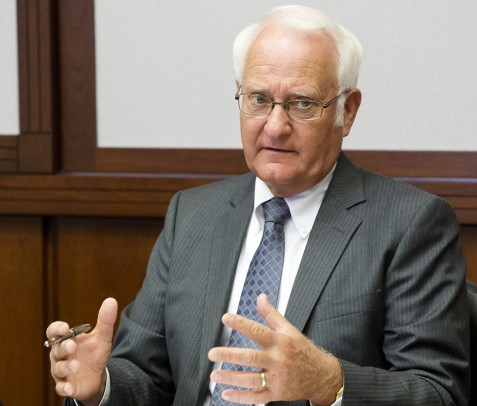Lawmakers hammer out pension changes

The university will “be engaged in the process until work on this issue so critical to our employees is completed,” says President Bob Easter. Photo: L. Brian Stauffer
With just a few weeks left in the legislative session, UI lobbyists say lawmakers may be close, after years of debate, to passing legislation that addresses the nearly $100 billion shortfall in the state pension system.
Two bills are under discussion at the Capitol and the U of I Institute of Government and Public Affairs has suggested a third solution to address the pension funding crisis.
The General Assembly is scheduled to adjourn May 31.
“The University of Illinois will continue to be engaged in the process until work on this issue so critical to our employees is completed,” UI President Bob Easter wrote in a May 3 email to the campus community.
“We will continue to make the case for our very reasonable and responsible alternative in the coming weeks as the various parties in Springfield seek a workable compromise.”
The Illinois House passed a plan May 2 sponsored by Speaker Michael Madigan, which amended Senate Bill 1. Both the House and Senate must approve the bill and its amendments before it would be sent to Gov. Pat Quinn for consideration.
Senate Bill 1 would:
• require public employees to pay 2 percent more toward their retirement benefits
• reduce annual cost-of-living increases for retirees
• raise the retirement age for workers younger than 45
• cap pensionable salary for Tier 1 employees
• change the effective rate of interest for the State Universities Retirement System.
Senate Bill 2404, which is backed by public labor unions, would give state workers a choice in changing their benefits. The bill was approved by the Senate Thursday, 40-16.
Employees could choose to lower their cost of living adjustments or keep them, with several options available depending on the employee’s decision. Other choices include eliminating or keeping state health insurance at retirement and paying a higher pension contribution to keep the cost of living adjustment.
The Institute of Government and Public Affairs has published a six-point plan for changes to pension legislation, supported by the presidents and chancellors at all the state’s public universities, Easter said.
“The fluidity and uncertainty of the situation in the face of a looming deadline affords an opportunity for renewed consideration of other ideas that have been proposed,” he said.
The IGPA plan, published March 13, would:
• change the annual cost of living adjustment
• adjust the value of the effective rate of interest
• require colleges and universities to contribute as much as 6.2 percent of the pension eligible payroll of employees
• increase employee contributions by 2 percent
• require the state to amortize the current State Universities Retirement System unfunded liability
• provide a “hybrid” plan including a defined benefit and defined contribution plan for new employees.
UI lobbyists in Springfield support the IGPA plan, said Kappy Laing, executive director of government relations.
“We continue to promote the IGPA proposal, which we think is the best deal available for university employees,” Laing said.
Although pension reform has been under discussion for a couple of years, it seems likely that state legislators will agree on a solution by the May 31 deadline, Laing said.
“A lot of people who are very close to it say so, so we’re crossing our fingers,” she said. “This has to be resolved so we can move on.”
